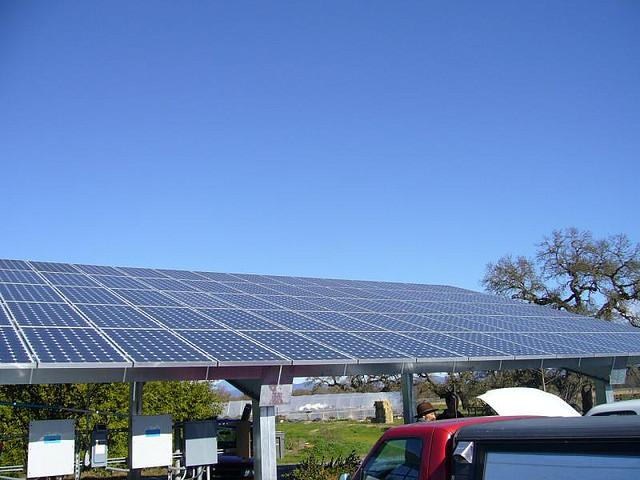Solar panels are one of the fastest growing energy sources around the world, offering an alternative way of providing energy for your home than through National Grid gas and electricity.
There are a range of sizes available to cater for all homes, whether you have a small two-bedroomed terraced property or a large detached house. Commercial installations are also popular, with businesses, schools and farms all reaping the benefits solar energy offers.
Domestic solar panels are usually fitted to the rooftop at an optimal angle to receive natural sunlight. Properties facing south have better results, but in fact the technology will work throughout the year on all property types.
Solar panels capture daylight, converting the energy into electricity to be used in the home. This can of course power lighting and appliances. With solar energy you can even receive a fixed income and sell excess electricity.

Image by santacruzfarm
So what are the benefits of solar panels?
- Earn a guaranteed income
Solar PV panels are a renewable technology and as such, the UK Government is keen to support installations around the country. To do this, they have made the feed-in tariff scheme available, paying out for every unit of renewable electricity generated. And the most efficient homes will earn even more, up to £600 annually.
- Reduce your electricity bills
The wholesale price of gas and electricity continues to rise and bills have doubled since 2004. What better way is there to protect yourself from the hikes than by generating your own electricity? Solar panels will work efficiently for 25 years and more, cutting bills by over £100 a year (subject to increase each time electricity National Grid prices are raised).
- Sell excess energy
Of course, solar panels will operate most efficiently during the daytime, when you’ll most likely be at work. But this isn’t a problem and you won’t have to worry about the energy you generate going to waste. Electricity not used in your home will instead be sold to the National Grid, providing an extra income on top of the feed-in tariff.
- Slash carbon dioxide emissions
Carbon dioxide is one of the main gases responsible for global warming problems. This has resulted in the EU setting tough targets for countries to meet. With solar panels in place you’ll reduce your own property’s carbon footprint and the Energy Saving Trust estimates that a 4kW system will reduce your CO2 emissions by over 40 tonnes.
- Low maintenance
If you thought solar technology could cost you a fortune in maintenance costs over the 25-year plus life expectancy, you couldn’t be further from the truth. Solar panels, like many renewables, are seen as a ‘fit and forget’ technology. Once installed you shouldn’t expect any faults and your only job will be to ensure optimal efficiency by preventing trees from casting the system into shadow.

The cost of solar panels in the UK
For solar panels to have a significant affect on your home’s energy bills you’ll need to invest in a 3.5kW or 4kW system. This kind of system could cost you as little as £6,000 but you should expect to pay nearer the £7,000 mark.
This is much cheaper than a couple of years ago when solar panels were at their most expensive and in 2010 you could expect to have paid more than £10,000 for the same sized system. This drop in price is particularly associated with a reduced feed-in tariff.
Of course, as with anything, it shouldn’t be a case of selecting the first price that comes your way. Consumer watchdog recommends receiving at least three of four professional quotations to compare between.
References
This article was written by Quotatis. For more information about Quotatis please visit http://www.quotatis.co.uk

